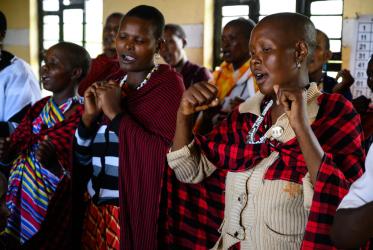Evangelical Lutheran Church in Zimbabwe
The Evangelical Lutheran Church in Zimbabwe was founded in 1903 by missionaries of the Church of Sweden Mission and African evangelists from Natal (South Africa). Zimbabwe (then Southern Rhodesia) was a mission field for the Lutheran Church in Natal. It began with educational work to enable converts to read the Bible. Medical work was added in 1915, thus completing the three-fold ministry of Christ of preaching, teaching and healing. The first trained African pastor was ordained in 1937. The Lutheran Church in Zimbabwe became autonomous from the Church of Sweden Mission and the Church in Natal in 1962.
The foundation of the church is (1) the word of God, namely the Old and New Testament, (2) the Creed of the Apostles, the Nicene and Athanasian Symbols and the pure Lutheran Doctrine in accordance with the Small Catechism of Martin Luther and the unaltered Augustana Confession. The church seeks to build on the foundation of this faith and doctrine unto a holy temple in the Lord through teaching and preaching the word of God and through the proper administration of the holy sacraments. It cooperates in mutual understanding with other churches for the extension of the kingdom of God. It aims at becoming a self-sup-porting and self-propagating church that cares for the sick and suffering and exercises the ministry of diakonia, and strives to overcome ignorance and superstition through sound education.
Eighty percent of the members are in the southern part of the country. This is the so-called Agro-Region IV and V, which is prone to drought. To equip God's people for the ministry of all baptized persons, the church has two Bible schools where deacons, lay leaders, and volunteers in HIV/AIDS ministry are trained, and retreats and refresher courses for pastors and their spouses are conducted. The church has four hospitals, two of which have been designated Districts-Refer-ral hospitals by the government. One has also a nursing school. The church runs four primary and seven secondary schools, of which six have an "A-level" component. Nine of the schools have units for visually impaired and hearing-impaired pupils at primary, secondary and high school levels.
Some of the constraints and challenges the church is facing are the shortage of pastors and senior medical staff, the HIV/AIDS pandemic, unemployment, poverty and high inflation. The ELCZ is very grateful to its bilateral partners in mission and development (Church of Sweden, LWF, ELCA Division for Global Mission, Berlin Mission Society, VELKD, WCC and the Lutheran Communion in Southern Africa-LUCSA), and to its service and development arm, the Lutheran Development Service (LDS-Zimbabwe).





